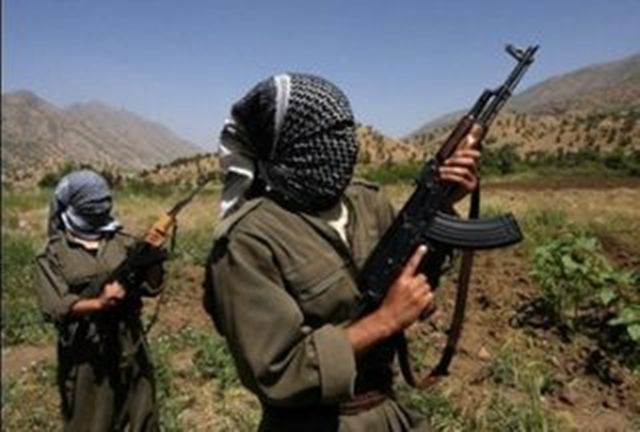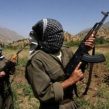
PKK Tactics May Reveal Damage Caused by Turkish Military Campaign
Publication: Terrorism Monitor Volume: 6 Issue: 16
By:

The fighting between Turkish security forces and the Kurdistan Worker’s Party (PKK) has intensified in recent months. Turkish air raids on the PKK camps in northern Iraq have resumed since mid-July. Between July 10 to July 16, 36 PKK members were killed, and there were reports the PKK’s military commander, Fehman Hüseyin (a.k.a. Dr. Bahoz Erdal), was seriously wounded in one of the air strikes (Hurriyet, July 18). Huseyin has not appeared in any pro-PKK media outlet since mid-July despite PKK denials of his injuries (Yeni Safak, July 18). At the end of the month, Turkish fighter jets hit a cave believed to be used as a bunker in the Quandil Mountains, killing 30 to 40 PKK members who took refuge there (Hurriyet, July 30). Turkish fighter jets also carried out three major raids (July 23, 27, and 29) against PKK camps in the Qandil Mountains and the Zap district of northern Iraq. For the month of July overall, the Turkish Armed Forces (TSK) claimed between 75 to 100 PKK members killed in various operations carried out by Turkish security forces (tsk.mil.tr, press releases for July).
To counter these attacks, the PKK has intensified its operations against Turkish security forces. One pattern is clear: in its recent attacks, the PKK has targeted not only military convoys and barracks in rural areas but also civilians and police stations in city centers. The Kurdish militants even threatened to set fire to forests in the Mediterranean, Aegean, and Marmara regions.
Recent Trends in PKK Operations
Beginning in mid-June, there was a visible increase in the PKK’s attacks on police stations in towns and city centers:
– On June 15, the PKK organized a rocket attack on a Hakkari police compound where families of police officers live (Hurriyet, June 15).
– On July 2, the PKK attacked the Guroymak police station in Bitlis province (Anadolu Ajansi, July 2);
– On July 9, a police station in Cemiskezek town of Tunceli province came under attack (polis-haber.com, July 9).
– On July 25, the PKK attacked a Yuksekova police post in Hakkari province (Milliyet, July 25).
– On July 28, another attack on a police station took place in Bingol province (Radikal, July 28).
Though such attacks were common in the terror campaign of the 1990s, they have been rare in recent years. Yet recent trends clearly show that, in addition to assaulting military barracks in towns and cities, the PKK has concentrated its operations in or around the city centers. In fact, the People’s Defense Forces (Hezen Parastina Gel – HPG), the armed wing of the PKK, announced that “the organization is punishing the police officers who terrorize the Kurds in the region” (hpg-online.com, August 2). The PKK, however, has not achieved any major success in these attacks in terms of killing police officers or soldiers.
The PKK’s focus on city centers stems partly from America’s provision of actionable real-time intelligence to the TSK. This has made PKK movement difficult and has interfered with the group’s ability to organize hit and run attacks on military convoys, which it used to carry out in previous years in rural areas. Moreover, the air raids in northern Iraq have significantly destroyed the PKK’s long-range radio communications. In the last two years, the TSK has bought jammers and other electronic equipment to improve its electronic prevention capacity against remote-controlled IED attacks. Thus, the PKK’s ability to mount IED attacks has significantly decreased compared to 2006 and 2007.
Are Forest Fires a Part of the PKK’s Strategy?
Despite the advantages it has brought to the Turkish security forces, it would be a mistake to reach the conclusion that intelligence gathering from American sources and Turkey’s own extensive use of unmanned aerial vehicles (UAVs) will be enough to tip the fighting in the TSK’s favor. The UAVs have their own weaknesses. Although the majority of the mountains in Kurdish region are not covered by thick forests, the surface of some mountains and valleys where PKK militants operate are densely forested, allowing PKK militants to move from one place to another unobserved.
In order to prevent PKK movement underneath the forest canopy without being detected by unmanned aircrafts, the TSK has taken measures, including thinning dense forests. The regional director of forests in Elazig province admits that “for security reasons, the TSK asks us to thin some dense forests by cutting out some of the trees. We help the TSK by cutting out the forests. However, in some areas the PKK has put pressure on us not to thin dense forests. In those places where we are not able to thin out the trees, bombs cause fires during the counter-terror operations. Because of the landmines, we are not even able to control such forest fires” (Taraf, July 27).
In July alone, more than 20 forest fires were reported in the Kurdish region. In response to the blazes, the HPG announced: “If the intentionally set forest fires continue in the Kurdish region, the Kurds will retaliate by turning the Mediterranean, Aegean, and Marmara regions (all Western parts of the country) into a hell” (hpg-online.com, July 27). It could be a deliberate effort of PKK sympathizers or just a coincidence that on July 29, two days after the HPG’s declaration, a forest fire began in Canakkale province (Marmara region) and another began in Antalya province (Mediterranean region) (cnnturk.com, July 29). Turkey’s biggest forest fire began on July 31 in Antalya province, a popular tourism destination for European vacationers, burning 4500 hectares of forest (cnnturk.com, August 5).
Attacks against Civilians
In addition to assaults against the security forces, two bombs exploded on July 26 in the shopping district of Gungoren, a suburb of Istanbul. The bomb explosions killed 18 civilians, including a pregnant woman and children, and wounded 154 others, causing a great outrage throughout Turkey. Police detained eight suspects who have ties to the PKK and are believed to be involved in the bombing attack (Hurriyet, August 2). The PKK immediately denied any involvement in the Gungoren bombing, and some critical media outlets raised questions about whether the bombing was indeed an act of the PKK (rojaciwan.com, August 3; Taraf, August 5). The Turkish Interior minister and the governor of Istanbul both, nonetheless, went before the public and clearly stated that without a doubt that the Gungoren bombing was carried out by PKK members trained in the Qandil mountains (Milliyet, August 5).
In the past, the PKK has denied its involvement in a bombing if it appeared the attack would harm its image at the national and international level, even if PKK militants were involved. For instance, the PKK initially rejected its involvement in the suicide attack in Ankara in May 2007 which killed 7 civilians and wounded 60 others (Hurriyet, May 22, 2007). PKK spokesmen later admitted “the possibility that the action may have been carried out by a unit loyal to our forces, on their own initiative” (Firat News Agency, January 7). In January 2008, a PKK member detonated a car bomb in Diyarbakir which killed 5 students and wounded 67 civilians (Radikal, January 4, 2008). In this incident PKK leaders also rejected any involvement at first, but later claimed the attack while announcing that it was “a mistake” (Sabah, February 5, 2008).
Sabotaging the Baku-Tbilisi-Ceyhan Pipeline
On August 5 it was reported that a large explosion had knocked out the Baku-Tbilisi-Ceyhan (BTC) oil pipeline in Erzincan province (Zaman, August 6). Immediately after the explosion, the HPG claimed responsibility for sabotaging the pipeline, which carries Azeri crude to European markets (hpg-online.com, August 6). The attack seemed to fulfill a 2006 statement by senior PKK leader Murat Karayilan: “I would say that in these days the BTC pipeline is not one of our targets. However, if the Turkish state extends its attacks on the Kurds, and situations on the ground significantly change, we could consider the BTC as a target” (gundemonline.net. July 17, 2006). Oil prices rose after the attack (Bloomberg.com, August 6). If in fact the explosion was the result of PKK sabotage, then we should assume that the situation on the ground has significantly changed for the PKK to begin targeting international investments in the region.
Conclusion
In terms of numbers lost in the TSK-PKK battle, it is impossible to obtain independent verification of the claims coming from either side. However, one of the most important aspects of the TSK’s campaign has been the infliction of significant damage to the communications capacity of the PKK. With growing U.S. surveillance and intelligence sharing, the PKK’s military leaders have started avoiding the use of telephones. Moreover, the PKK’s long range radio communication infrastructure was seriously damaged. Thus, starting from the beginning of 2008, the PKK may have relocated militants with training on how to prepare and detonate bombs to the metropolises and told them to detonate bombs whenever they find it suitable.
If bombing attacks such as the one in Gungoren are not planned by the PKK’s central authorities, it could signal a growing weakness in the PKK’s command and control structure. The PKK is traditionally known for its rigid top-down command structure. In order to keep the organization intact and to maintain discipline, PKK leaders have not hesitated in the past to kill senior militants who deviate from the command structure, such as Kani Yilmaz and Hikmet Fidan, who left the organization to form a nonviolent alternative group, the Patriotic Democratic Party (Partiya Welatparezen Demokraten Kurdistan – WPD-K). [1] If the recent bombing in Istanbul were carried out without approval from the PKK leadership, it could be a sign that the PKK’s strict hierarchy no longer controls its members. Except for the May 6 assault on the Aktutun border station, the PKK’s recent assaults on police stations and military barracks have not produced any significant damage to Turkish security forces. Undeterred by these small-scale attacks, Turkish security forces have intensified their counter-terror campaign within Turkey’s borders and northern Iraq, which, at the very least, should provide a psychological advantage over the PKK.
Given the present sensitivity of international markets to even minor disruptions in oil supply, the PKK attack on the BTC pipeline risks raising international anger against the PKK cause. Nations on the receiving end of the BTC supply are unlikely to tolerate the PKK as a destabilizing force in their vital energy corridors. The attack suggests the PKK may now be in such a difficult position that it is prepared to gamble with its very existence against the international community.
Notes:
1. “Chronology of the Important Events in the World/PKK Chronology (1976-2006)”, Journal of the Turkish Weekly, May 27, 2007.




